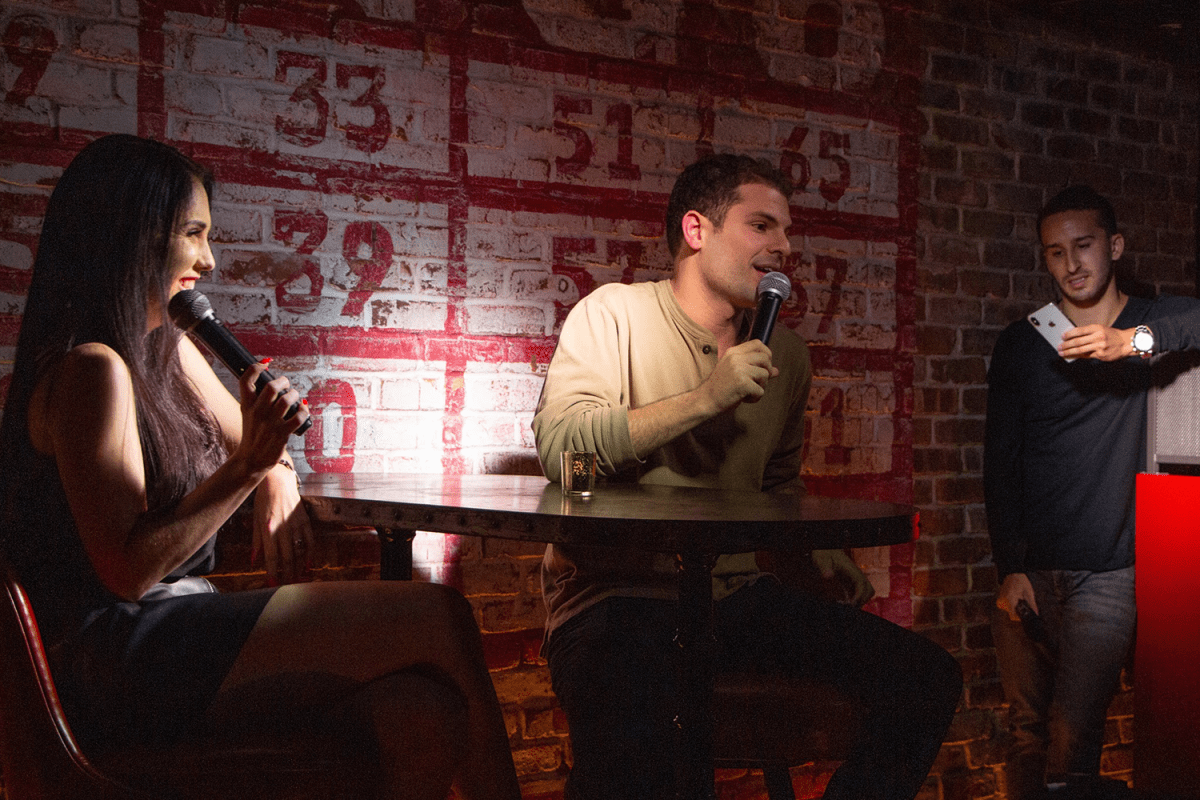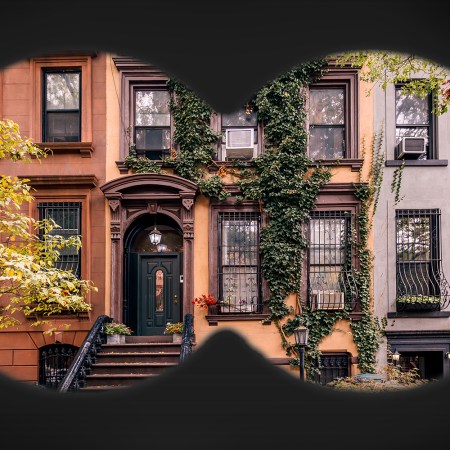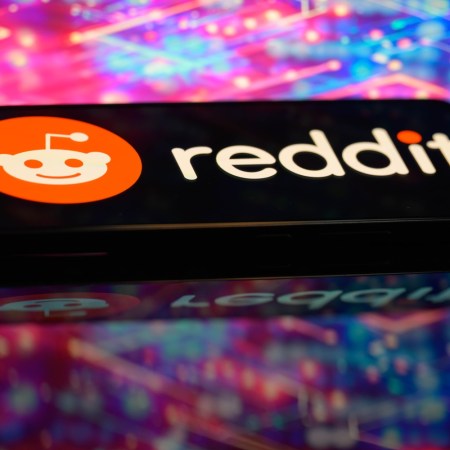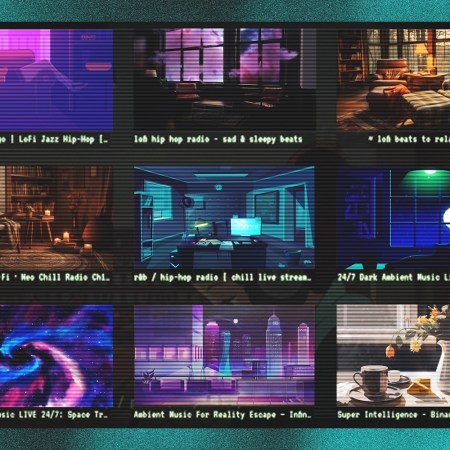A one-night stand, according to a childhood misconception Sloane Crosley describes in I Was Told There’d Be Cake, occurs when two people stand on a bed holding full Martini glasses and try not to spill them for the entirety of the evening.
I think about this as I walk blindfolded toward a stage in the packed basement of a Manhattan hotel, remembering a childhood misunderstanding of my own involving the concept of blind dates. Such romantic encounters, as I pictured them, involved two people — one of whom always wore a black cocktail dress — joining each other for a candlelit dinner while, for reasons I never bothered to investigate, both wearing blindfolds.
As I wade blindly through the crowded Midtown venue where an audience has gathered to watch me go on a date with an actual blindfold strapped across my eyes, I think about the one-night bed-standers of Crosley’s childhood imagination and the blindfolded daters of my own.
“It’s remarkable the logic we’ll build around a misapprehension,” writes Crosley of the detailed illustration with which she once filled the gaps in her understanding of adult romance and sexuality.
As I blindly navigate my way in high heels, a production assistant guides me to my seat onstage and hands me a microphone, leaving my blindfold firmly in place. As I take my seat across the table from my date, a man blinded by similar means, it occurs to me that the realities we’ll build around such misapprehensions may be even more remarkable than the logic.
Blind dating gets a modern UpDate
It’s a Friday night in the Fishbowl at the Dream Midtown, and the reality that so bizarrely mirrors my childhood misconception of a blind date has a name. It’s called UpDating.
The brainchild of comedian Brandon Berman and former Facebook employee Harrison Forman, UpDating puts real New Yorkers on blind dates in front of live audiences in what the show’s website calls “a charming, high-octane adventure into the world of dating.” Combining the fast pace and sudden intimacy of dating in the digital age into a spectacle that straddles the line between reality and performance, UpDating exists somewhere at the intersection of live comedy, reality TV and authentic, real-life interaction.
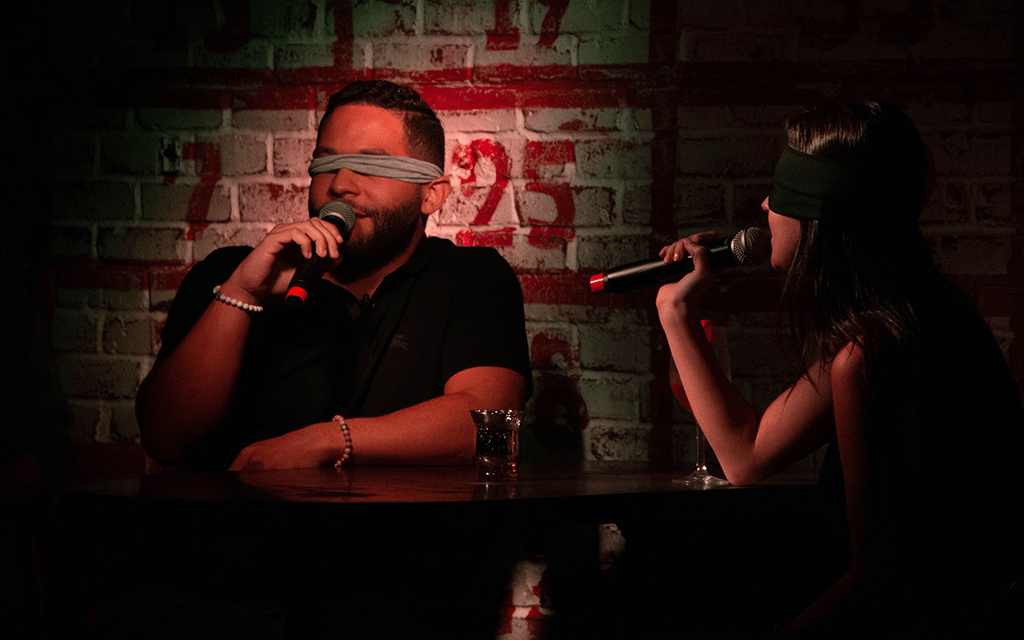
In other words, as Berman tells InsideHook, “It’s a combination of a lot of things, this show.”
What started with Forman broadcasting his own dates on Facebook Live three years ago in San Francisco, UpDating has existed in its current format for just over a year, in which time Berman and Forman have hosted more than 30 blind dates in front of live audiences in sold-out venues throughout Manhattan and Brooklyn.
What those audiences see is an approximately 90-minute show, hosted by Berman and starring two New Yorkers on a real, unscripted, unfiltered blind date — although the blindfolds do eventually come off.
As Forman and Berman will tell you, no two shows are alike. “Some shows are raunchy, other shows are more romantic, and then other shows are really deep and religious and spiritual,” says Forman. In the 30+ iterations of UpDating that have played out across New York, Forman and Berman have seen everything from mothers and daughters questioning each other’s suitors to impromptu audience-delivered monologues on Mormonism and religious freedom. The one common thread that unites each unpredictable show to the next? Honesty.
“I don’t think there’s anything more authentic and unfiltered and honest than UpDating,” Forman tells InsideHook.
“That was our vision for the show,” adds Berman. “The underlying theme was just pure vulnerability — not only with two people, but with a whole room experiencing that with you.”
It’s those shared experiences that I think make our content really special.
For Berman and Forman, that real-life experience of group vulnerability combined with the growing culture of emotional oversharing that’s blossomed on social media in recent years manifests among UpDating audiences as something comparable to a kind of group therapy.
“I think it’s very good for mental health, our show,” says Berman. “I really do.”
That’s because, for all the inevitable comparisons to The Bachelor UpDating tends to attract, Forman and Berman aren’t just trying to play matchmaker or stir up drama for an audience. More than romance or entertainment, UpDating has, perhaps ironically, always been about providing space for authentic connections of all kinds.
Forman and Berman have seen some dates go well and many go poorly, but regardless of the outcome between the prospective couple onstage, UpDating always seems to find a way of accomplishing its founding goal of bringing people together. During the second half of the show, audience members have a chance to shoot their shot with either of the daters on stage, turning the show into an interactive experience for cast and audience alike. “It should have an impact on the people on the date because they’re really opening themselves up,” says Forman, “and it should also have an impact on people in the audience who are watching other people go through this.”
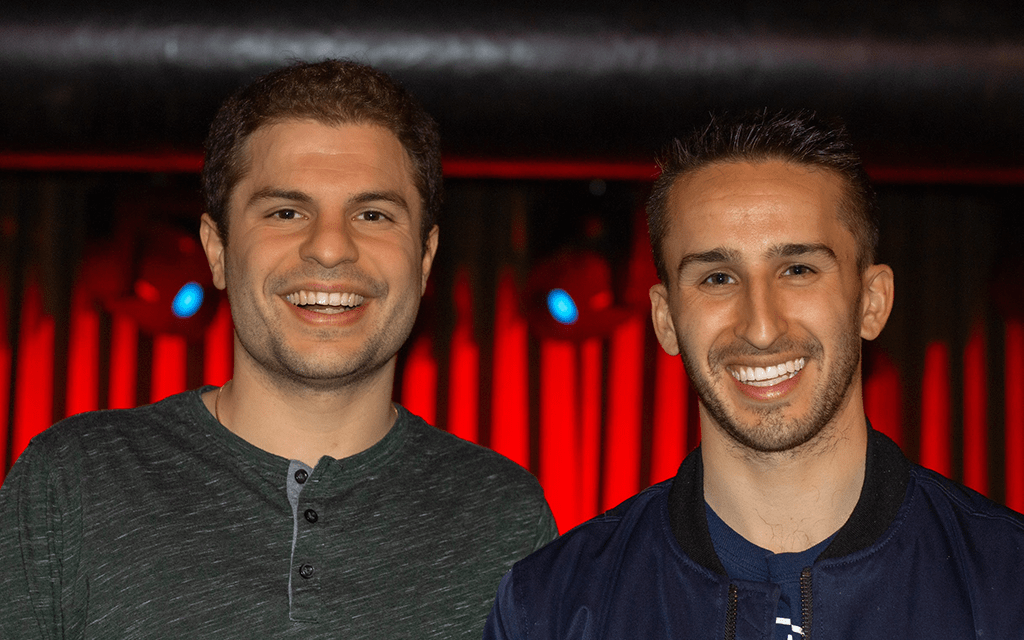
By and large, the show continues to surpass that goal, often generating some of the most moving reactions from male audience members. “A lot of them have said to me, ‘Because of this show and seeing this, I was able to be more vulnerable on dates and be a little more honest,’” Berman tells InsideHook. “People may not always meet at the show,” he adds. “But 99 percent of people leave this and do take something from that show and approach dating differently.”
“It’s those shared experiences that I think make our content really special,” adds Forman.
The Ghost of Dating Yet to Come
If UpDating is, as CNBC has claimed, “the future of dating,” it’s also the past.
Both Berman and Forman wax nostalgic for a bygone era of New York City romance, painting an image of dating culture pulled straight out of Sex and the City — a shared influence both will cop to unapologetically.
Other ’90s and early-aughts icons pepper UpDating’s backstory as well. Berman cites Howard Stern as his chief comedic inspiration — “I say it literally every day,” he tells me, after mentioning Stern for the fourth time in three phone calls — and the duo shares a love of the 2004 teen flick The Girl Next Door.
In many ways, UpDating is a return to these older models of dating and romance, remnants of what Forman calls “the Sex and the City-era, where you don’t really see phones anywhere.”
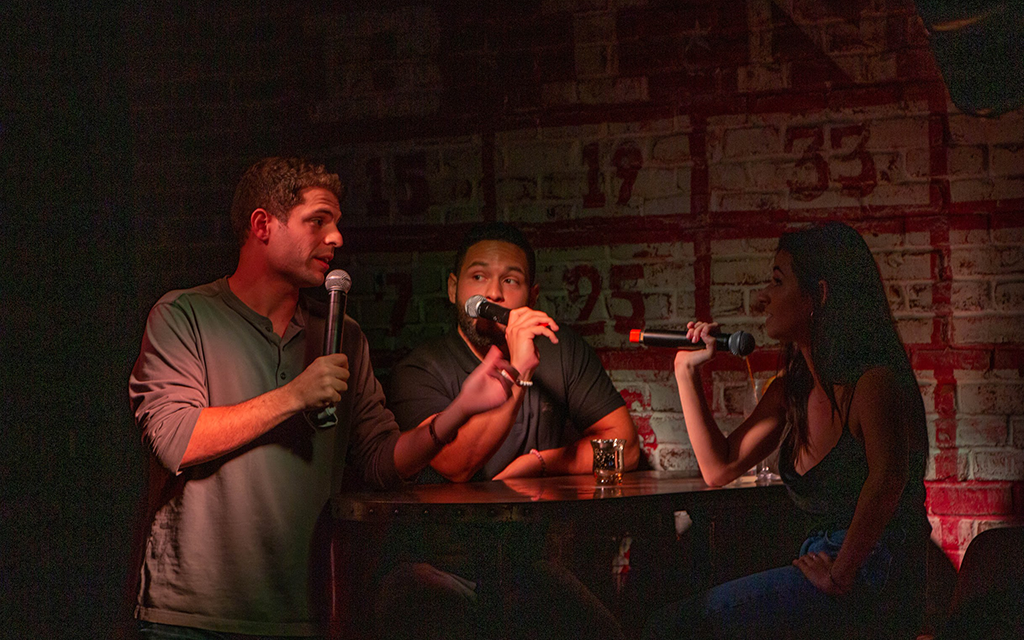
However, as a Facebook alum with a self-described background at the intersection of tech and media, Forman has no intention of trying to thwart technology altogether. Rather than a delusional attempt to recreate an idealized vision of dating pre-internet, Forman and Berman have found a way to expertly blend the tools of the digital age with the romantic nostalgia of decades past.
“It would be a little naïve if we didn’t utilize technology at all,” says Forman. “It would be really ignorant of us if we just said, ‘get away from all digital.’ That’s just not going to happen. So we had to figure out a way to create our show that is modern with some of these tools, but also goes back to what I personally love, which is the romance of the ’80s and ’90s and early 2000s.”
Right now, much of UpDating’s engagement with the digital age takes place on Instagram. Audience members use the app to DM questions and comments for the daters throughout the show, turning a digital platform often accused of contributing to a growing culture of social disengagement into a vessel for real-life, in-person interaction.
We can bring people together that would normally never swipe right.
UpDating has a slightly more complicated relationship with other apps, namely certain swipe-based ones that are largely responsible for redefining the modern dating landscape as we know it today. While the show is often positioned as a haven for weary app-daters craving a reprieve from endless swiping, its creators don’t necessarily see it as strictly in opposition with dating apps, but rather as an alternative that is in some ways a product of dating-app culture.
“Our official UpDating position is not, ‘Get off dating apps,’” says Forman, who says the show instead hopes to foster a culture of “renewed confidence” among today’s singles. “Dating apps shouldn’t be your only option, your only route,” he says. “You should be able to be confident to go out there in real life and meet people in bars, venues, maybe on a stage in front of a live audience.”
Unlike dating apps like Hinge, the self-branded app “designed to be deleted” that’s currently plastering the subway with ads promising to deliver your soulmate, UpDating isn’t strictly in the business of happily ever after. While the show has its romantic “success stories,” UpDating is first and foremost about facilitating connections, especially ones that probably wouldn’t have occurred otherwise.
“We can bring people together that would normally never swipe right,” says Berman. “I want to take people from different walks of life and watch and see what it’s like for them to date.”
“Berman and I have never said we’re these ultimate matchmakers,” adds Forman. “We’re figuring it out just like everyone else.”
Real-world influencers
Another testament to UpDating’s unique ability to simultaneously embrace and subvert the usually all-encompassing influence of the digital age is the show’s remarkable success in the absence of a comparably dominant social media presence.
UpDating is different from just about every other successful young brand today in that the majority of its power doesn’t come from likes and followers. While the show has the obligatory Twitter and Instagram accounts, their relatively small following (just under 2,000 Instagram followers at time of writing) scarcely reflects the volume of influence the show maintains among its real-life followers — aka the 100+ audience members who regularly pack UpDating’s sold-out shows, leaving as many as 50 more people outside hoping to get in.
“We do have a waitlist every week,” says Berman. “It’s a good problem.”
While those who judge UpDating by its relatively low social-media following may be surprised to see the vast interest the show regularly attracts in real life, UpDating’s lack of social media promotion is largely by design.
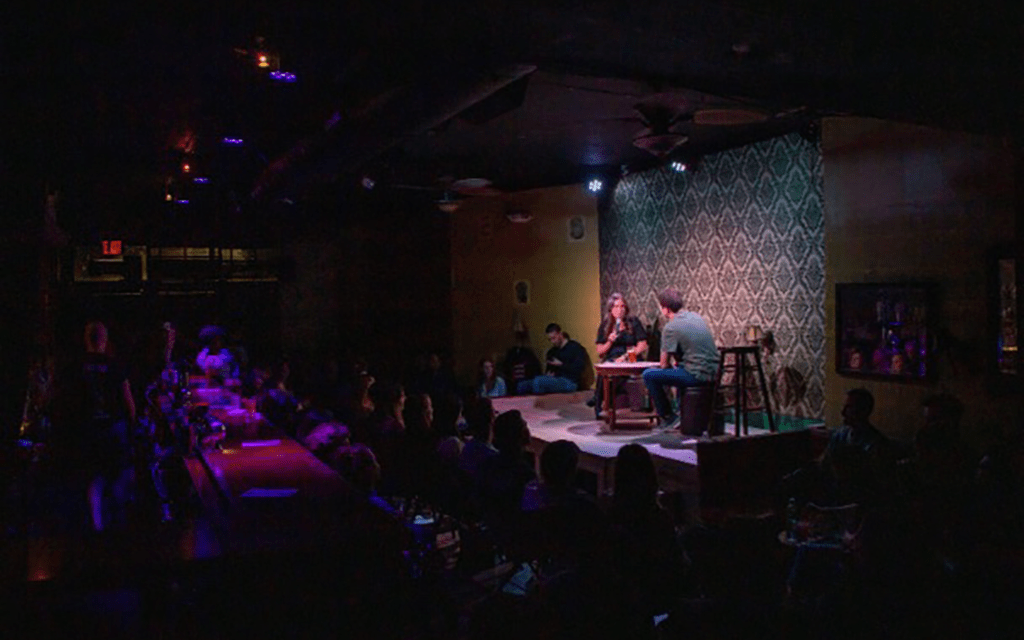
“Yes, we could buy followers and have a lot more,” says Forman. “But we’re more old school. Let’s get people in a room and get them connecting that way. That’s been our focus from day one.”
In other words, UpDating is thriving not just despite its quiet social presence, but largely because of it.
“We haven’t really spent a dime on marketing. It’s all been word of mouth and organic,” says Forman. “We’re relying on creating really good content, really good experiences.”
While the show itself is less than two hours out of their week, Berman and Forman “live the brand on a daily basis,” promoting the show at bars throughout the city, crashing real first dates, and getting to know prospective UpDaters through a lengthy casting process that feels more like a heart-to-heart phone call with an old friend.
“Yes, we have Instagram accounts, but we’re not focused on that,” says Forman. “We live in the real world. That’s who we are.”
In many ways, UpDating is a product of its time. In at least as many, it is also timeless. It’s at once a throwback to a bygone era of dating and a testament to the current one. Lifting and subverting aspects of one or the other, it’s carved out its own frontier in the modern dating landscape.
Whether you’re looking to get into shape, or just get out of a funk, The Charge has got you covered. Sign up for our new wellness newsletter today.
